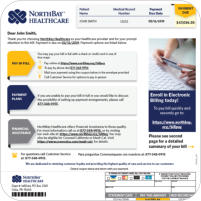When you get emergency care or are treated by an out-of-network provider at an in-network hospital or ambulatory surgical center, you are protected from balance billing. In these cases, you shouldn’t be charged more than your plan’s copayments, coinsurance and/or deductible.
What is "balance billing" (sometimes called "surprise billing")?
When you see a doctor or other health care provider, you may owe certain out-of-pocket costs, like a copayment, coinsurance, or deductible. You may have additional costs or have to pay the entire bill if you see a provider or visit a health care facility that isn't in your health plan's network.
"Out-of-network" means providers and facilities that haven't signed a contract with your health plan to provide services. Out-of-network providers may be allowed to bill you for the difference between what your plan pays and the full amount charged for a service. This is called "balance billing." This amount is likely more than in-network costs for the same service and might not count toward your plan's deductible or annual out-of-pocket limit.
"Surprise billing" is an unexpected balance bill. This can happen when you can't control who is involved in your care-like when you have an emergency or when you schedule a visit at an in-network facility but are unexpectedly treated by an out-of-network provider. Surprise medical bills could cost thousands of dollars depending on the procedure or service.
You're protected from balance billing for:
Emergency services
If you have an emergency medical condition and get emergency services from an out-of-network provider or facility, the most they can bill you is your plan's in-network cost-sharing amount (such as copayments, coinsurance, and deductibles). You can't be balance billed for these emergency services. This includes services you may get after you're in stable condition, unless you give written consent and give up your protections not to be balanced billed for these post-stabilization services.
California state law has similar protections to the federal No Surprises Act.
Certain services at an in-network hospital or ambulatory surgical center
When you get services from an in-network hospital or ambulatory surgical center, certain providers there may be out-of-network. In these cases, the most those providers can bill you is your plan's in-network cost-sharing amount. This applies to emergency medicine, anesthesia, pathology, radiology, laboratory, neonatology, assistant surgeon, hospitalist, or intensivist services. These providers can't balance bill you and may not ask you to give up your protections not to be balance billed. If you get other types of services at these in-network facilities, out-of-network providers can't balance bill you, unless you give written consent and give up your protections.
You're never required to give up your protections from balance billing. You also aren't required to get out-of-network care. You can choose a provider or facility in your plan's network.
California state law has similar protections to the federal No Surprises Act. More information can be found at California Department of Managed Care Surprise Medical Bills Fact Sheet.
When balance billing isn't allowed, you also have these protections:
- You're only responsible for paying your share of the cost (like the copayments, coinsurance, and deductible that you would pay if the provider or facility was in-network). Your health plan will pay any additional costs to out-of-network providers and facilities directly.
- Generally, your health plan must:
- Cover emergency services without requiring you to get approval for services in advance (also known as "prior authorization").
- Cover emergency services by out-of-network providers.
- Base what you owe the provider or facility (cost-sharing) on what it would pay an in-network provider or facility and show that amount in your explanation of benefits.
- Count any amount you pay for emergency services or out-of-network services toward your in-network deductible and out-of-pocket limit.
If you think you’ve been wrongly billed, contact the Centers for Medicare and Medicaid Services at CMS at www.cms.gov for your rights under federal law. The federal phone number for information and complaints is: 1-800-985-3059].
For more information about your rights under California state law visit California Department of Managed Health Care at www.dmhc.ca.gov or California Department of Insurance at www.insurance.ca.gov.
Common Questions About Billing
Yes. Please bring your insurance card with you to the hospital or physician’s office and remember that you are ultimately responsible for ensuring that the bill is paid.
Most likely, these bills are for services provided by physicians who are independent from the hospital and must bill separately. Check our Accepted Health Plans page to reference whether your insurance plan extends to care from our physicians.
Please notify us immediately if you file an appeal with your health insurance company regarding their decision about the portion of the bill for which you are responsible so that we are aware of any potential delays in payment.
First, contact Solano County Health & Social Services (800) 400-6001. Or, you may go to your local office to apply for Medi-Cal/State County Medical Services Plan (CMSP). Be sure to apply within the same month that you received service because certain programs do not offer benefits retro-actively for the previous month. If you are denied Medi-Cal/State CMSP, then contact our Financial Counseling Department (707) 646-5637 to find out whether you qualify for NorthBay’s Financial Assistance program or Uninsured Discount Program.
Learn how you can track, manage and pay your NorthBay Health bills online.

